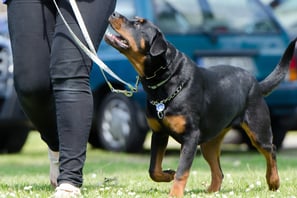Essential Foundational Skills for Service Dogs
Discover the key foundational skills that all service dogs should know and learn, as well as advanced techniques commonly taught to these specialized dogs.
TRAINING TIPS
Crysta Germany
7/3/20244 min read









What Should Your Dog Know?
Training a service dog involves teaching various universal commands and skills, which can provide a solid base for learning more specialized tasks and ensure the safety and well-being of both handler and dog. You should have somewhere to start, though. Here, we outline some of the essential skills your service dog should master.
Basic Obedience Skills:
Sit: This foundational skill keeps your dog's attention on you and helps maintain their position.
Stay: Teaching your dog to stay in one place allows you to move freely without worrying about the dog being under foot or getting into trouble.
Come: This command ensures that your dog returns to you when called, providing control over their actions and location. It can ensure their safety in potentially dangerous situations as well.
Public Access Skills:
Heel: This command teaches your dog to walk beside you, keeping their focus on you and avoiding straying into other people's space.
Settle: This skill helps your dog relax and remain calm in various environments, even where there may be distractions
Ignore Distractions: Training your dog to ignore distractions ensures they remain focused on their tasks and do not react inappropriately to external stimuli.
Socialization and Behavior:
Calm Behavior in Crowds: This skill is crucial for keeping your dog safe and relaxed in crowded areas, preventing potential issues.
Interacting with Other Animals: Your dog should know how to behave around other animals, dismissing distractions when needed and remaining calm and non-aggressive.
Friendly Demeanor: A calm and friendly dog is less likely to cause aggressive interactions, making public outings more pleasant and safe.
Task-Specific Skills:
Retrieving Items: This is a common task that assists the handler and keeps the dog mentally stimulated. It's relatively easy to train and similar to playing fetch.
Opening Doors: This more advanced task is useful for many handlers and provide good challenges for your dog, keeping them stimulated.
Medical Alerting: This critical task varies widely, including things from seizure alerts to panic attacks. While it can be tricky to train, it is highly beneficial and commonly used.
Conclusion:
These common foundational skills are essential for a service dog's training. Mastering these commands ensures that you service dog can effectively assist you, remain well-behaved in public, and handle specific tasks that cater to your needs.
Photo Credit: zen chang on pexels, sammy sander on pixabay
What Should Your Dog Know?
Training a service dog involves teaching various universal commands and skills, which can provide a solid base for learning more specialized tasks and ensure the safety and well-being of both handler and dog. You should have somewhere to start, though. Here, we outline some of the essential skills your service dog should master.
Basic Obedience Skills:
Sit: This foundational skill keeps your dog's attention on you and helps maintain their position.
Stay: Teaching your dog to stay in one place allows you to move freely without worrying about the dog being under foot or getting into trouble.
Come: This command ensures that your dog returns to you when called, providing control over their actions and location. It can ensure their safety in potentially dangerous situations as well.
Public Access Skills:
Heel: This command teaches your dog to walk beside you, keeping their focus on you and avoiding straying into other people's space.
Settle: This skill helps your dog relax and remain calm in various environments, even where there may be distractions
Ignore Distractions: Training your dog to ignore distractions ensures they remain focused on their tasks and do not react inappropriately to external stimuli.
Socialization and Behavior:
Calm Behavior in Crowds: This skill is crucial for keeping your dog safe and relaxed in crowded areas, preventing potential issues.
Interacting with Other Animals: Your dog should know how to behave around other animals, dismissing distractions when needed and remaining calm and non-aggressive.
Friendly Demeanor: A calm and friendly dog is less likely to cause aggressive interactions, making public outings more pleasant and safe.
Task-Specific Skills:
Retrieving Items: This is a common task that assists the handler and keeps the dog mentally stimulated. It's relatively easy to train and similar to playing fetch.
Opening Doors: This more advanced task is useful for many handlers and provide good challenges for your dog, keeping them stimulated.
Medical Alerting: This critical task varies widely, including things from seizure alerts to panic attacks. While it can be tricky to train, it is highly beneficial and commonly used.
Conclusion:
These common foundational skills are essential for a service dog's training. Mastering these commands ensures that you service dog can effectively assist you, remain well-behaved in public, and handle specific tasks that cater to your needs.
Photo Credit: zen chang on pexels, sammy sander on pixabay
